When the World Falls Into the Flames We Will Rise Again Lyrics
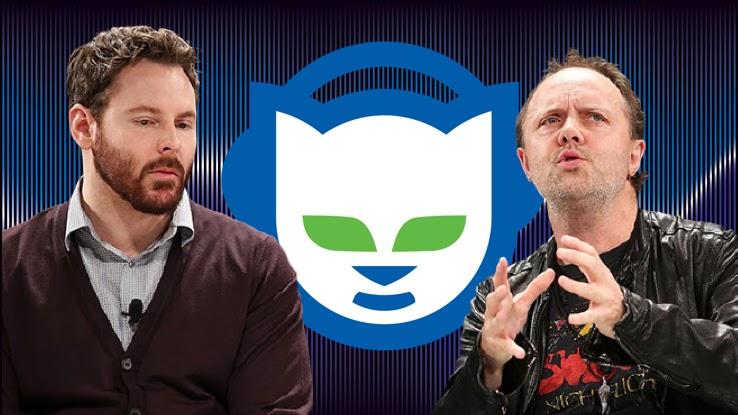
Equally y'all read this, in that location's a good chance you lot're enjoying some amazing tunes through an online streaming service like Spotify, Pandora or Apple Music. Or maybe you prefer keeping things a footling bit erstwhile-schoolhouse with your trusty iPod and — ready for it? — headphones that actually take wires. No matter what your favorite style to melody in might exist, it's condom to say the manner we listen to music, not to mention the music industry itself, has evolved drastically in the last couple of decades. Many people credit this musical revolution to the peer-to-peer (P2P) file-sharing software programme Napster.
But Napster'due south appeal to everyday listeners — namely the ability to aggrandize their music libraries without having to pay to access that new music — was also responsible for its downfall. After facing plush lawsuits from irate executives and artists, Napster shut down its servers in July of 2001. As we approach the 2-decade mark since Napster's demise, we're taking a await back at the ascent and fall of i of the most controversial web-based applications in internet history, from its origins to the way it changed the music industry forever.
The Rise of Napster: What Led to the Digital Audio Formats of Today?
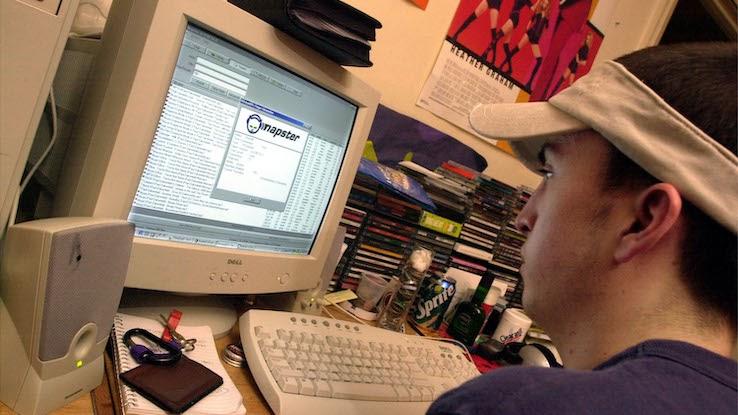
Earlier we dive into exactly what Napster was, it helps to take a look at the dissimilar ways music storage was made commercially available to u.s. — and how these audio formats evolved. Starting in the 1800s, if people wanted to own music, they purchased large discs fabricated from hard rubber or shellac that were stamped with grooves to create vibrations that played songs. These were some of the primeval records people had access to. In the 1940s, manufacturers started making the discs from polyvinyl chloride, giving rise to the term "vinyl" in reference to record albums.
By the mid-1960s, electronics companies had figured out how to shop music on magnetic tape spooled in plastic housings. Known as 8-track tapes, they enjoyed widespread use before slimming down to smaller cassette tapes in the 1980s. And these analog methods of playing music became about-extinct when compact discs (CDs) invaded record stores everywhere. After dominating the market as the music-storage format of choice for several decades, withal, CDs, too, were eventually eclipsed. A new innovation was on the horizon — and we weren't going to need physical storage methods like records, cassette tapes or CDs to access our favorite songs anymore.
When personal computers began to meet more widespread employ in the late 1980s and early 1990s, programmers developed methods of storing audio digitally to provide the audio on their software programs. Music industry executives also saw dollar signs in the decision to produce CD-ROMs that contained songs stored every bit digital Waveform Audio Files (WAV) on these discs. Every bit with whatsoever technological advocacy, users plant ways to copy WAV files from their CDs and store those files on their computers. This meant someone could purchase an album on CD, copy the music to their computer and store it on the same device.
And this also meant people could share that music with family and friends. Like copying a cassette record, the premise of making copies of songs or creating playlists to give to our high school love interests wasn't exactly something new. But in the belatedly 1990s, music sharing was prepare to become global when programmers Shawn Fanning and Sean Parker created an application to share digital vocal files among millions of users.
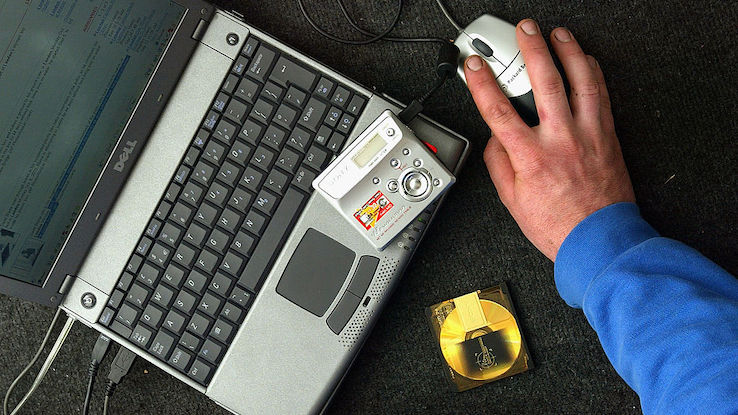
Napster essentially pioneered P2P file-sharing clients. Just what exactly does that hateful? Users "ripped" WAV files from CDs, meaning they copied the digital audio files from CDs to programs on their computers and condensed that digital information into smaller files — what nosotros now know equally MP3s — that were more suitable for fast downloading. They and then uploaded these MP3 files to Napster's service, saving the files with the music artist's name and the vocal title. By downloading Napster, users essentially joined a network that gave them access to the file libraries of everyone else who was too using Napster.
A user could operate Napster'southward search function to wait for a track proper noun or artist, and the file names popped up in search results. After a quick double-click and a few minutes, the file downloaded to the user's estimator, where they could and so transfer information technology to a portable media histrion like an iPod. The more people who downloaded the MP3, the faster the file downloaded — and the further it spread to new users without people having to purchase the actual albums the songs were officially available on.
Once someone had downloaded music files for free, they were able to do what they wanted with those files — technically speaking, but maybe not ethically and then. And record labels and artists weren't able to contain this widespread, illicit distribution of music, then they weren't able to profit from it the fashion they expected to. Thus began the back-and-forth battle betwixt tape labels, artists and consumers on the ideals and legality of P2P file sharing.
Napster Vicious Just as Apace as It Rose
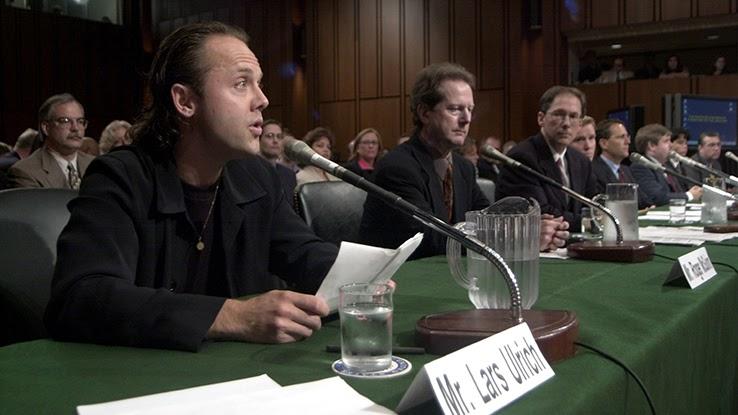
At its peak, Napster had virtually lxxx 1000000 registered users — a surprising number because that the service was only operational from June 1999 to July 2001. And this massive popularity as well quickly raised the ire of music industry professionals who were concerned about the loss of profits and uncontrolled distribution of their intellectual property.
In 2000, Metallica sued Napster and a few colleges, including USC, Yale and Indiana University, for encouraging students to copy songs. Drummer Lars Ulrich wasn't shy with his criticisms of the service, saying, "Information technology is sickening to know that our art is beingness traded like a article rather than the fine art that it is." Even subsequently facing fierce backlash from fans who thought the decision was purely fiscal, Ulrich'southward stance didn't waver. In a 2014 Reddit AMA, he wrote, "The whole thing was virtually one thing and one matter only — control… If I wanna give my s*** away for free, I'll give it abroad for free. That option was taken away from me." Ulrich also appeared before Congress, accusing Napster of copyright infringement and testifying well-nigh its potential damages.
Dr. Dre, hip-hop pioneer and founder of Death Row Records, lost coin as both an artist and a producer due to file-sharing on Napster. He filed a lawsuit in 2000 confronting Napster while leaving open the possibility of suing individual users. In a statement, Dr. Dre's chaser Howard Rex was blunt: "If it turns out that there are people who take huge difficult drives and actually are downloading copyrighted materials and transmitting [them] on the internet, we may very well get after them because they are engaged in theft."
Napster eventually reached settlements with various artists, record labels and the Recording Industry Association of America and was ordered by a federal judge to block music from any artist who didn't want it to be shared on the service. Every bit a upshot of the litigation, Napster close down its servers on July eleven, 2001, and tried to transform into a paid service that never caught on.
Not All Artists Protested the Service
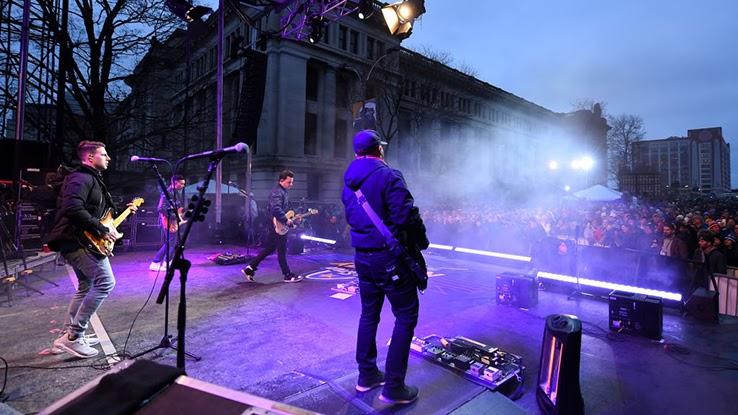
Perchance surprisingly, some music artists take cited Napster equally a catalyst for their popularity, not a detractor, considering information technology allowed many more people to detect their music. The folk/rock band Of A Revolution (O.A.R) became a nationwide success on college campuses with the vocal "Crazy Game of Poker." The reason? "Napster led to what we can do today," drummer Chris Culos told the Badger Herald. "Once people found out about the band [via Napster], they went dorsum and supported us by buying records, coming to shows, or passing it on to their friends. In our instance, Napster was huge."
Several artists were thrilled at the innovative method Napster presented for reaching much broader audiences. Chris Cornell of bands Soundgarden and Audioslave said, "I think this aspect of technology is really going to bring a lot of different angles of life and commerciality out of the corporate world and give it dorsum to the individuals." Co-ordinate to AV Lodge, Napster was also responsible for turning Radiohead into "global superstars." The English band had never had a top-xx hit in the U.S., but after their 2000 album Kid A made its way to Napster 3 months earlier its release date, millions of people began downloading it — and Kid Adebuted at the number-one spot on the Billboard 200 sales chart.
The value of Napster as a potential promotional tool became part of its appeal in an increasingly divided industry. Even artists similar David Bowie, Billy Corgan and Limp Bizkit happily adapted to the new method for sharing music across the world. Napster represented an exciting new way for artists to reach fans, fifty-fifty if other established artists — and federal courts — didn't share the sentiment.
The End of an Era: Napster's Rebirth and Adaptation Fizzle Out With Fans
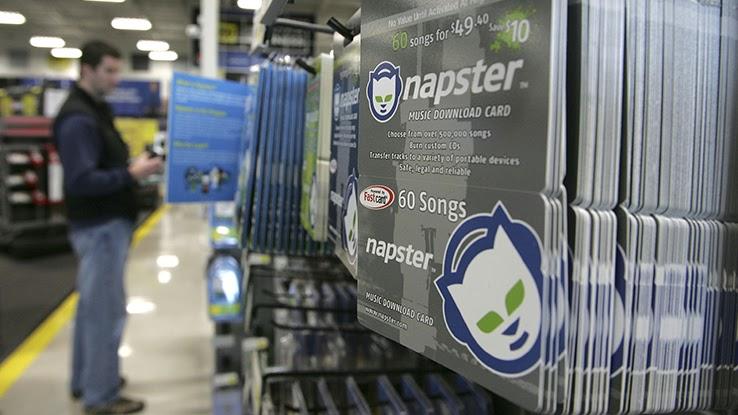
Software company Roxio, which creates programs for called-for CDs and DVDs, purchased Napster's brand and logos in a bankruptcy sale before long afterwards the shutdown in an effort to re-brand some other music service it bought, Pressplay, as Napster 2.0 — a paid version. Napster and so changed hands once again post-obit electronics giant Best Purchase's buy of the service before transferring once again to Rhapsody, one of the first streaming services to offer the monthly-subscription format that leaders like Spotify and Apple Music now follow.
In August 2020, Napster was once more sold — this time to MelodyVR, a virtual reality concert platform. Throughout all these transformations and corporate transactions, users jumped ship, not knowing how the platform would change once more with each new auction or rebrand. Today, about 3 1000000 people use Napster — a far fall from the 80 million users the service saw at its new-millennium tiptop.
Although the music industry won the boxing against Napster, the state of war to cease gratis digital music sharing continues. BitTorrent, a like P2P sharing platform, is now the about common method for sharing music, movies, books, computer software and other digital files. More than 170 1000000 users are active on this platform, despite internet service providers' frequent attempted crackdowns on users who break copyright infringement laws.
Today, many artists produce their music on domicile studio computers, host cocky-booked tours and promote themselves on social media, funding success without the bankroll of big record labels. Napster'south democratization of music potentially sparked the movement that freed artists to become contained of record labels in ways they couldn't have anticipated 30 years ago.
Other aspects of Napster may have been far ahead of their time, too. Recollect those pesky digital files that led to Napster'southward downfall? Many of today's artists include gratuitous downloads of their albums with a vinyl record purchase, eliminating the need to download songs illegally to obtain digital copies. Equally The Smashing Pumpkins' Billy Corgan stated early on on, "This revolution has already taken place" — just the music industry is undergoing continual revolutions even today. And Napster deserves credit for taking the risks that ultimately spurred this digital revolution.
Source: https://www.ask.com/entertainment/napster-20-years-later?utm_content=params%3Ao%3D740004%26ad%3DdirN%26qo%3DserpIndex
Postar um comentário for "When the World Falls Into the Flames We Will Rise Again Lyrics"